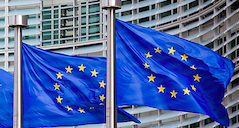The European Commission has proposed an EU budget of €166.7 billion in commitments for 2021, down 9.7% on 2020.
This would be the first budget for EU 27 — assuming the withdrawal of the UK and the end of the transition period.
The EC said the budget will be “complemented by €211 billion in grants and €133 billion in loans under Next Generation EU, the temporary recovery instrument aimed at mobilising investments and kick-starting the European economy.”
Commissioner Johannes Hahn, responsible for the EU Budget stated: “In these extraordinary times, the European Commission’s proposal mobilises unprecedented support.
“The annual budget 2021 will help hundreds of thousands of people, companies and regions to overcome the crisis and emerge stronger than before.
“To make it happen, we need an agreement on the long-term budget and Next Generation EU – a deal that will send a signal of confidence throughout Europe.”
The Commission said it is proposing to allocate:
– €1.34 billion for Digital Europe programme for the Union’s cyber-defences and support the digital transition;
– €3 billion for Connecting Europe Facility in an up-to-date, high-performance transport infrastructure to facilitate cross-border connections;
– €575 million for the Single Market Programme, €36.2 million and €127 million respectively for the programmes supporting cooperation in the fields of taxation and customs;
– €2.89 billion for Erasmus Plus to invest in young people, as well as €306 million for the cultural and creative sectors through Creative Europe;
– €1.1 billion for the Asylum and Migration Fund and €1.0 billion for Integrated Border Management Fund to step up cooperation on external border management as well as migration and asylum policy;
– €55.2 billion for the Common Agricultural Policy and €813 million for the European Maritime and Fisheries Fund, for Europe’s farmers and fishermen, but also to strengthen the resilience of the agri-food and fisheries sectors and to provide the necessary scope for crisis management;
– €228 million for the Internal Security Fund and €1.05 million for the European Defence Fund to support the European strategic autonomy and security;
– €1.9 billion for pre-accession assistance, to support our neighbours, including in the Western Balkans;
In addition, large part of the funds will go to the priority actions identified in connection with Next Generation EU, including:
– €131.5 billion of loans and approximately €133 billion of grants can be provided to Member States under the Recovery and Resilience Facility, as part of Next Generation EU;
– €17.3 billion for Horizon Europe, to increase European support for health and climate-related research and innovation activities, of which €5 billion under Next Generation EU;
– €10.13 billion for InvestEU, to invest in sustainable infrastructure, innovation and digitisation. Part of the money will be for the Strategic Investment Facility, to build strategic autonomy in vital supply chains at European level;
– €8.28 billion for the Solvency Support Instrument as proposed by Next Generation EU, to address the solvency concerns of viable companies from all economic sectors;
– €47.15 billion for cohesion policy, to be complemented by €42.45 billion under REACT-EU as proposed under Next Generation EU. The money will go for employment subsidies, short time work schemes and youth employment measures; liquidity and solvency for SMEs;
– €9.47 billion for the Just Transition Fund to make sure the transition towards climate neutrality leaves nobody behind, of which €7.96 billion under Next Generation EU;
– €619 million for rescEU, the Union civil protection mechanism, to make sure the Union has the capacity to respond to large-scale emergencies;
– €1.19 billion for EU4Health, the new health programme, which will equip our Union against future health threats; of which €1.17 billion from Next Generation EU;
– €15.36 billion for our external partners through the Neighbourhood, Development and International Cooperation Instrument (NDICI) of which €3.29 billion under Next Generation EU;
– €2.8 billion for humanitarian aid, of which €1.3 billion under Next Generation EU, for the growing humanitarian needs in the most vulnerable parts of the world.
